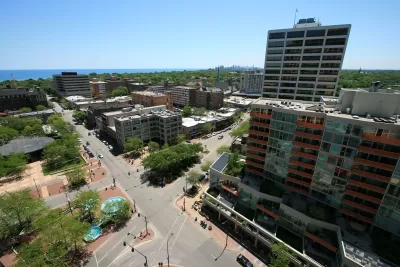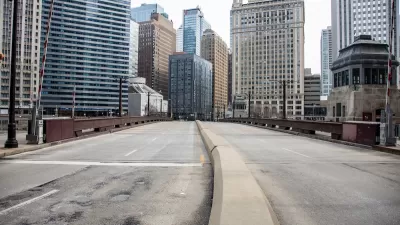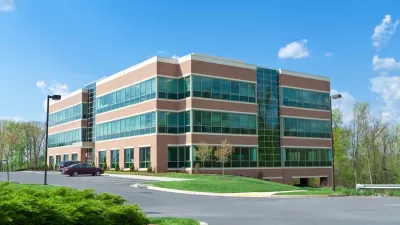As more workers move away from the central city due to high costs and remote work opportunities, companies that once relocated downtown are eyeing Chicago’s suburbs once again.

Chicago’s suburbs could be having a renaissance, writes Katharine Conlon. “From food giant Hillshire Brands to Motorola Solutions and in-flight WiFi provider Gogo, the past decade has brought a spate of relocations from the suburbs into the city, with the past two years of remote work pushing suburban office vacancy even higher, to a record 27% at the end of last year, according to JLL data.” Thanks to new work patterns spurred by the pandemic and rising downtown housing costs, however, the Chicago suburbs are seemingly making a comeback.
The traditional suburban form is changing, too. “Wendy Spreenberg, founder and president of YES! Your Exceptional Space, said Chicago suburbs are embracing the 15-minute city concept that emphasizes a decentralized local economy in which all necessary amenities are within a short walk, bike ride or public transit trip.”
As the article notes, “Some formerly downtown-only companies have already begun dipping their toes into suburban waters as workers begin transitioning back to the office, if only on a hybrid basis.”
According to Core Acquisitions Managing Principal Adam Firsel, “How the suburban market will shake out and how the new hybrid work landscape will impact decisions about location and footprints are open questions.” For now, “companies [are] still reluctant to commit to long-term leases or set square footage requirements.”
FULL STORY: Changing Minds on Restrictive Zoning: How to Unclog America’s Home Supply

Planetizen Federal Action Tracker
A weekly monitor of how Trump’s orders and actions are impacting planners and planning in America.

Map: Where Senate Republicans Want to Sell Your Public Lands
For public land advocates, the Senate Republicans’ proposal to sell millions of acres of public land in the West is “the biggest fight of their careers.”

Restaurant Patios Were a Pandemic Win — Why Were They so Hard to Keep?
Social distancing requirements and changes in travel patterns prompted cities to pilot new uses for street and sidewalk space. Then it got complicated.

Platform Pilsner: Vancouver Transit Agency Releases... a Beer?
TransLink will receive a portion of every sale of the four-pack.

Toronto Weighs Cheaper Transit, Parking Hikes for Major Events
Special event rates would take effect during large festivals, sports games and concerts to ‘discourage driving, manage congestion and free up space for transit.”

Berlin to Consider Car-Free Zone Larger Than Manhattan
The area bound by the 22-mile Ringbahn would still allow 12 uses of a private automobile per year per person, and several other exemptions.
Urban Design for Planners 1: Software Tools
This six-course series explores essential urban design concepts using open source software and equips planners with the tools they need to participate fully in the urban design process.
Planning for Universal Design
Learn the tools for implementing Universal Design in planning regulations.
Heyer Gruel & Associates PA
JM Goldson LLC
Custer County Colorado
City of Camden Redevelopment Agency
City of Astoria
Transportation Research & Education Center (TREC) at Portland State University
Camden Redevelopment Agency
City of Claremont
Municipality of Princeton (NJ)





























